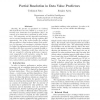Free Online Productivity Tools
i2Speak
i2Symbol
i2OCR
iTex2Img
iWeb2Print
iWeb2Shot
i2Type
iPdf2Split
iPdf2Merge
i2Bopomofo
i2Arabic
i2Style
i2Image
i2PDF
iLatex2Rtf
Sci2ools
ICPP
2000
IEEE
2000
IEEE
Partial Resolution in Data Value Predictors
Recently, the practice of speculation in resolving data dependences has been studied as a means of extracting more instruction level parallelism (ILP). An outcome of an instruction is predicted by value predictors. The instruction and its dependent instructions can be executed simultaneously, thereby exploiting ILP aggressively. One of the serious hurdles for realizing data speculation is huge hardware budget of the predictors. In this paper, we investigate a technique reducing the budget by employing partial resolution, using fewer tag address bits than necessary to uniquely identify every instruction. Simulation results show only two tag bits are enough for achieving performance improvement comparable to full resolution, saving the hardware budget of value predictors substantially.
Distributed And Parallel Computing | Hardware Budget | ICPP 2000 | Instructions | Value Predictors |
Related Content
| Added | 31 Jul 2010 |
| Updated | 31 Jul 2010 |
| Type | Conference |
| Year | 2000 |
| Where | ICPP |
| Authors | Toshinori Sato, Itsujiro Arita |
Comments (0)

